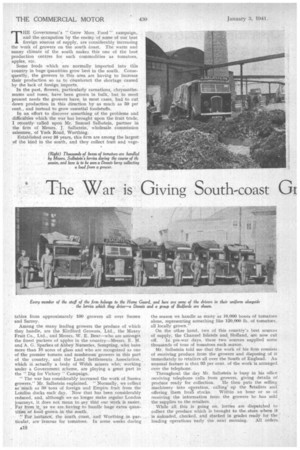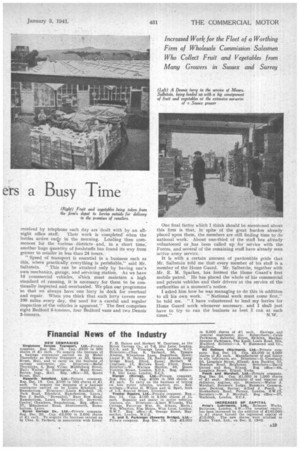The War is iving South-coast Gt
Page 20

Page 21

If you've noticed an error in this article please click here to report it so we can fix it.
ers a Busy Time
increased Work for the Fleet of a Worthing Firm of Wholesale Commission Salesmen Who Collect Fruit and Vegetables from Many Growers in Sussex and Surrey
THE. Government's "Grow More .Food"" campaign, and the occupation by the enemy of some of our b.est foreign source.s of supply, are considerably increasing the work of growers on the south Coast. The warm and sunny climate of the south makes this one of the best production centres for such commodities as tomatoes,
apples, etc. . Some foods which are normally imported into this country in huge quantities grow best in the south. Conse quently, the growers in this area are having to increase their production so as to cOunteract the shortage caused by the lack of foreign imports. .
In the past, flowers, particularly carnations, chrysanthemums and roses, have been grown in hulk, • but to meet
present needs the growers have, in most cases, had to cut down production in this direction by as much as 50 per cent., and instead to grow essential foodstuffs.
In an effort to discover something of the problems and difficulties which the war has brought upon the fruit trade, I recently, called upon Mr. Samuel Salbstein, partner in the firm of Messrs. j. Salbstein, wholesale commission salesmen, of York Road, Worthing.
Established over 35 years, this firm are among the largest of the kind in the south, and they collect fruit and vege
tables from approximately 100 growers all over Sussex and Surrey.
Among the many leading growers the produce of which they handle, are the Kirdford Growers, Ltd., the Maxey Fruit Co., Ltd., and Messrs. W. E. Bear—who are amongst the finest packers of apples in the country--Messrs. E. M. and-A. G. Sparkes of Abbey Nurseries, Sompting, who have more than 10 acres of glass and who are recognized as one of the premier tomato and mushroom growers in this part of the country, and the Land Settlements Association, which is .actually a ,body of Welsh miners who, working under a Government scheme, are playing a great part in the ". Dig for Victory ". Campaign.
"The war has considerably increased the work of Sussex growers," Mr. Salbstein explained. "Normally, we collect as .rinuch as 30 tons of foreign and Empire fruit from the London docks each day. Now that has been .considerably reduced, and, although we no longer .make regular London journeys, it .does not mean to say that our 'work is easier. Far from it as we are flaying to handle huge extra quantities. of food grown in the .south.
!' For instance, the itistith coast,and Worthing in particular, are famous for tomatoes. In some weeks during the season we.handle as ma.riy as 10,000 boxes of tomatoes alone, representing something like 120,000 lb. of tomatoes, all locally grown."
On the other hand, two cif this country's best sources of supply, the Channel Islands and Holland, are now cut off. In pre-war days, these two sources supplied some thousands of tons of tomatoes each season.
Mr. Salbstein told me that the work of his firm consists of receiving produce frOm the growers and disposing of it immediately, to retailers all over the South of England. An unusual feature is that 95 per cent. of the work is arranged. over the telephone.
Throughout the day Mr. Salbstein is busy in his office receiving telephone calls from growers, .giving details of produce ready for collection. He then puts the selling machinery into operation, calling' up the fetailers and' offering them tresfi stocks. Within an hour or so of receiving the information from the growers he has 'sold
the supplies to the retailers. . . • . • While all., this is going on, lorries are dispatched to • collect the produce which is brought to thestore where it is Unloaded, ehecked, and stacked in grades ready for the loading operations early tbe. neXt. morning. All orders
received by telephone each day are dealt with by an all night office staff. Their work is completed When the lorries arrive ear4y in the morning. Loading then commences for the various districts and, in a short time: another huge quantity of foodstuffs has found its way from grower to retailer in less than 24 hours..
" Speed of transport is essential in a business such as this, where practically everything is perishable," said Mr. Salbstein. " This can be attained only by having. one's own mechanics, garage, and servicing station. As we have 14 commercial vehicles, 137hich must maintain a high standard of running, it is necessary for them to be continually inspected and overhauled. We plan our programme -so that we always have one lorry in dock for overhaul and repair. When you think that each lorry covers over 100 miles every day, the need for a careful and regular inspection of the vehicles is apparent." The fleet comprises eight Bedford 5-tonners, four Bedford vans and two Dennis 3-tonners.
One final factor which I think should be mentioned about this firm is that, in spite of the great burden already placed upon them, the members are still finding time to do national work. About one-third of the staff has already volunteered or has been called up for service with the Forces, and several of the remaining staff have already seen active army service.
It is with a certain amount of pardonable pride that Mr. Salbstein told me thalt every member of his staff is a member of the Home Guard. Mr. Salbst.2in, together with Mr. E. M. Sparkes, has formed the Home Guard's first mobile patrol. He has placed the whole of his commercial and private vehicles and their drivers at the service of the authorities at a moment's notice.
I asked him how he was managing to do this in addition to all his own work. "National work must come first," he told me, " I have volunteered to lend my lorries for Home Guard work whenever necessary, and I shall just have to try to run the business as best I can at such times." N.W.




















































